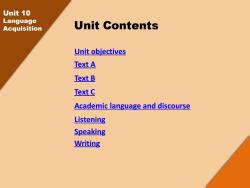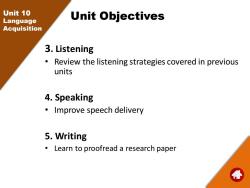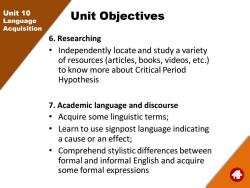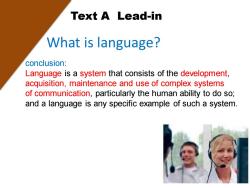《大学英语》课程PPT教学课件(学术英语综合)Unit 10 Language Acquisition

UNIT 10 Language Acquisition How early in life are we humans cognitive of language?When do we recognize that some of the sounds we hear are distinctive, intentional,meaningful communication?Are we programmed biologically to speak or taught to speak in a social environment? Why do babies pick up a language or even languages so quickly but adults don't?Read on and see if the theories presented in this unit can convince you

Unit 10 Language Acquisition Unit Contents Unit objectives Text A Text B Text C Academic language and discourse Listening Speaking Writing
Unit 10 Language Acquisition Unit Contents Unit objectives Text A Text B Text C Academic language and discourse Listening Speaking Writing

Unit 10 Unit Objectives Language Acquisition 1.Professional Knowledge Know more about the following issues related with language acquisition(e.g.the nature of language acquisition;the differences between first language acquisition and second language learning/acquisition; the role of age in language acquisition etc.) 2.Reading Summarize the main ideas of a text and identify essential supporting points; Understand difficult sentences (e.g.,sentences with abstract meaning or ambiguous reference); Know how to make use of examples and quoting in expository and argumentative writing; Analyze complex or controversial issues critically(e.g., the nature of language acquisition,the best age for language acquisition
Unit Objectives 1. Professional Knowledge • Know more about the following issues related with language acquisition( e.g. the nature of language acquisition; the differences between first language acquisition and second language learning/acquisition; the role of age in language acquisition , etc.) 2. Reading • Summarize the main ideas of a text and identify essential supporting points; • Understand difficult sentences (e.g., sentences with abstract meaning or ambiguous reference); • Know how to make use of examples and quoting in expository and argumentative writing; • Analyze complex or controversial issues critically (e.g., the nature of language acquisition, the best age for language acquisition …) Unit 10 Language Acquisition

Unit 10 Language Unit Objectives Acquisition 3.Listening Review the listening strategies covered in previous units 4.Speaking Improve speech delivery 5.Writing Learn to proofread a research paper
Unit Objectives 3. Listening • Review the listening strategies covered in previous units 4. Speaking • Improve speech delivery 5. Writing • Learn to proofread a research paper Unit 10 Language Acquisition

Unit 10 Unit Objectives Language Acquisition 6.Researching Independently locate and study a variety of resources (articles,books,videos,etc.) to know more about Critical Period Hypothesis 7.Academic language and discourse Acquire some linguistic terms; ● Learn to use signpost language indicating a cause or an effect; Comprehend stylistic differences between formal and informal English and acquire some formal expressions
Unit Objectives 6. Researching • Independently locate and study a variety of resources (articles, books, videos, etc.) to know more about Critical Period Hypothesis 7. Academic language and discourse • Acquire some linguistic terms; • Learn to use signpost language indicating a cause or an effect; • Comprehend stylistic differences between formal and informal English and acquire some formal expressions Unit 10 Language Acquisition

Text A Lead-in Q1.What is language? Work with your partner and figure out a definition of“language
Text A Lead-in Q1. What is language? Unit 10 Language Acq uisition Work with your partner and figure out a definition of “language

Text A Lead-in verbal communication C你好 BonjouD Ciao! annot Hello?Hei! 今日!hoa/ 70 林
Text A Lead-in verbal communication Unit 10 Language Acq uisition

Text A Lead-in nonverbal communication 示
Text A Lead-in nonverbal communication

Different forms of communication: verbal communication语言交流;文字交流 nonverbal communication非语言的交流;非文字的交流 examples of non-verbal ways of communication: language(speaking sounds dance facial expressions signs (sign language body movements body language gestures postures scents(气味)
Different forms of communication: examples of non-verbal ways of communication: language (speaking ) sounds dance facial expressions signs (sign language ) body movements / body language gestures / postures scents (气味) verbal communication 语言交流;文字交流 nonverbal communication 非语言的交流;非文字的交流

Text A Lead-in What is language? conclusion: Language is a system that consists of the development, acquisition,maintenance and use of complex systems of communication,particularly the human ability to do so; and a language is any specific example of such a system
Text A Lead-in What is language? Unit 10 Language Acq uisition conclusion: Language is a system that consists of the development, acquisition, maintenance and use of complex systems of communication, particularly the human ability to do so; and a language is any specific example of such a system
按次数下载不扣除下载券;
注册用户24小时内重复下载只扣除一次;
顺序:VIP每日次数-->可用次数-->下载券;
- 《大学英语》课程PPT教学课件(学术英语综合)Unit 02 Business Ethics.ppt
- 《大学英语》课程PPT教学课件(学术英语综合)Unit 01 Economics(Academic English - An Integrated Course for Undergraduates).ppt
- 《新编大学英语》综合教程(第三版第四册)B4U2_self-market_For Teacher, B4U2.doc
- 《新编大学英语》综合教程(第三版第四册)B4U6_Words, phrases and grammarical points.doc
- 《新编大学英语》综合教程(第三版第四册)B4U6_self-market_self-writing_图表作文常用结尾句.doc
- 《新编大学英语》综合教程(第三版第四册)B4U6_self-market_self-reading_Why would people like to take risks.doc
- 《新编大学英语》综合教程(第三版第四册)B4U6_self-market_self-listening_Words you need to know.doc
- 《新编大学英语》综合教程(第三版第四册)B4U6_self-market_self-listening_a pilot's job.doc
- 《新编大学英语》综合教程(第三版第四册)B4U6_self-market_quiz_B4U06 Quiz.doc
- 《新编大学英语》综合教程(第三版第四册)B4U6_self-market_oral quiz.ppt
- 《新编大学英语》综合教程(第三版第四册)B4U6_Background information.doc
- 《新编大学英语》综合教程(第三版第四册)B4U6 Translation & Writing.ppt
- 《新编大学英语》综合教程(第三版第四册)B4U6 Read by critical thinking.ppt
- 《新编大学英语》综合教程(第三版第四册)B4U6 Menu.ppt
- 《新编大学英语》综合教程(第三版第四册)B4U6 Activate.ppt
- 《新编大学英语》综合教程(第三版第四册)B4U5_Vocabulary and grammar.doc
- 《新编大学英语》综合教程(第三版第四册)B4U5_self-market_self-writing_图表作文常用开头句.doc
- 《新编大学英语》综合教程(第三版第四册)B4U5_self-market_self-watching_rich list.doc
- 《新编大学英语》综合教程(第三版第四册)B4U5_self-market_self-reading_true role models.doc
- 《新编大学英语》综合教程(第三版第四册)B4U5_self-market_self-listening_2000sydney.doc
- 《大学英语》课程PPT教学课件(学术英语综合)Unit 03 Psychology.ppt
- 《大学英语》课程PPT教学课件(学术英语综合)Unit 04 Environment.ppt
- 《大学英语》课程PPT教学课件(学术英语综合)Unit 05 Philosophy.ppt
- 《大学英语》课程PPT教学课件(学术英语综合)Unit 06 Mathematics.ppt
- 《大学英语》课程PPT教学课件(学术英语综合)Unit 07 Sociology.ppt
- 《大学英语》课程PPT教学课件(学术英语综合)Unit 08 Globalization.ppt
- 《大学英语》课程PPT教学课件(学术英语综合)Unit 09 Medicine.ppt
- 佛山大学(佛山科学技术学院):《基础英语》课程教学资源(TEM真题讲解)2006-2007TEM4词汇真题详解(打印版).pdf
- 佛山大学(佛山科学技术学院):《基础英语》课程教学资源(TEM真题讲解)2008-2009TEM4词汇真题详解(打印版).pdf
- 佛山大学(佛山科学技术学院):《基础英语》课程教学资源(TEM真题讲解)2010-2011TEM4词汇真题详解(打印版).pdf
- 佛山大学(佛山科学技术学院):《基础英语》课程教学资源(TEM真题讲解)2006-2007专四词汇真题汇总(含答案).pdf
- 佛山大学(佛山科学技术学院):《基础英语》课程教学资源(TEM真题讲解)状语(打印版).pdf
- 佛山大学(佛山科学技术学院):《基础英语》课程教学资源(TEM真题讲解)特殊结构(打印版).pdf
- 佛山大学(佛山科学技术学院):《基础英语》课程教学资源(TEM真题讲解)主谓一致(打印版).pdf
- 佛山大学(佛山科学技术学院):《基础英语》课程教学资源(TEM真题讲解)冠词(打印版).pdf
- 佛山大学(佛山科学技术学院):《基础英语》课程教学资源(TEM真题讲解)倍数(打印版).pdf
- 佛山大学(佛山科学技术学院):《基础英语》课程教学资源(TEM真题讲解)专四完型填空题(2003-2005,习题).pdf
- 佛山大学(佛山科学技术学院):《基础英语》课程教学资源(TEM真题讲解)专四完型填空题(2003-2005,答案详解).pdf.pdf
- 佛山大学(佛山科学技术学院):《基础英语》课程教学资源(教学大纲)《英语语法》教学大纲 PRACTICAL ENGLISH GRAMMAR.pdf
- 佛山大学(佛山科学技术学院):《基础英语》课程教学资源(教学大纲)基础综合英语教学大纲 INTEGRATED ENGLISH.pdf
